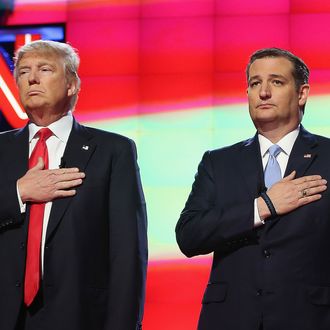
Periodically during this most fractious of Republican nominating contests, the fear of a total party rift and/or a third-party candidacy has spurred party elders and conservative media to insist on a “loyalty pledge” committing the candidates to mutual support after the deal finally goes down. The issue first arose last summer when fears of a Trump indie bid led to formal “loyalty pledge” demands by certain state parties prior to certification of primary candidacies; he signed a pledge on September 3. It was revived during a March 2 debate in Detroit when all of the surviving candidates repeated their vows to support the nominee after an evening of uninhibited insults exchanged between Marco Rubio and Ted Cruz on one side and Trump on the other.
At the time it seemed the renewal of vows in Detroit showed the marriage between the candidates and the GOP could survive just about anything. But then the mutual abuse got a whole lot worse.
No matter where, exactly, you lay the blame in the wild exchange of insults between Trump and Cruz over their wives, and then over the National Enquirer’s claims of serial adultery by Cruz (which the Texan blames entirely on Trump and his minions), the language has reached a new low. Trump now routinely refers to Cruz as “Lying Ted Cruz,” as though that’s his universally acknowledged nickname. Cruz has now called Trump a “sniveling coward” and “a rodent.”
And yes, there are new questions as to whether the “loyalty pledge” is again in jeopardy, and not just from Trump and Cruz, but from the third remaining GOP candidate as well, as RealClearPolitics’ Rebecca Berg reports:
[A]s it looks increasingly possible that the nominee will in fact be Trump, the remaining candidates are beginning to waver in their promised support as they grapple with personal misgivings and mounting pressure to disavow the celebrity businessman outright.
“We’re going to look at it every single day, and we’ll see what happens,” Ohio Gov. John Kasich said Sunday on NBC’s “Meet the Press.” “We’ve got a long way to go.”
Last week, as Sen. Ted Cruz attacked Trump as a “sniveling coward” for attacks on his wife, he was less emphatic when asked whether he could support Trump in a general election.
“Donald Trump will not be the nominee,” Cruz said simply.
It wasn’t a “no,” but it wasn’t a “yes,” either. It marked a notable departure from Cruz’s remarks just two weeks ago, when he assured reporters he still planned to back the party’s nominee. Period.
It’s probably worth noting that there are no more candidate debates planned where the contenders can be simultaneously coerced into repeating their loyalty pledges.
Now, it’s possible that the passage of time has reduced the urgency of the loyalty pledge, as the likelihood of a sore loser being able to launch a viable third-party or independent candidacy declines. But there remains the little problem of a Republican National Convention, which if “contested” will already be a nightmare of confusion and conflict in the absence of a putative nominee to make decisions. If it concludes not with unity gestures but with the losers issuing still more insults and threats, the GOP is going to get off to an extraordinarily bad start in its general-election campaign.
If the candidates somehow manage to pull back from the gates of delirium and endorse the nominee (realistically either Trump or Cruz, unless party elites want to risk a massive backlash by wresting the nomination away from both of them in favor of a dark horse or of Kasich), there will be something of a credibility problem. And moreover, such a gesture would require a rationalization involving the comparative evils of the Democratic foe that will make prior attacks on Hillary Clinton and Bernie Sanders look like a game of patty-cake. Exactly what would Cruz have to say about Democrats to justify support for a “sniveling coward”? And exactly how could Trump frame the endorsement of a congenital liar and “nasty man”? These are not questions past losing nomination candidates have had to answer.






























